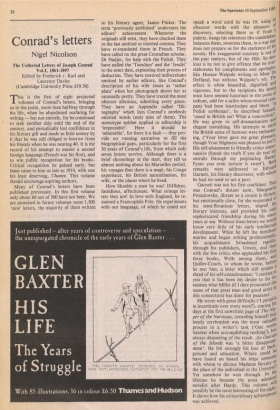Conrad's letters
Nigel Nicolson
The Collected Letters of Joseph Conrad Vol.I, 1861-1897 Edited by Frederick r. Karl and Laurence Davies (Cambridge University Press 19.50) This is the first of eight projected
1 volumes of Conrad's letters, bringing us to the point, more than halfway through his life, when he abandoned seafaring for writing — but not entirely, for he continued to seek another ship until the end of the century, and periodically lost confidence in his literary gift and made so little money by it that he was still obliged to borrow from his friends when he was nearing 40. It is the record of his attempt to master a second foreign language (French was his first), and to win public recognition for his books. Critical recognition he gained early, but fame came to him as late as 1914, with one his least deserving, Chance. This volume should encourage aspiring authors.
Many of Conrad's letters have been published previously. In this first volume only about 60 out of 300 have not been. We are promised in future volumes some 1,500 'new' letters, the majority of them written to his literary agent, James Pinker. The term 'previously published' underrates the editors' achievement. Whenever the originals still exist, they have checked them to the last omitted or inserted comma. They have re-translated those in French. They have called on the great Conradian scholar, Dr Nadjer, for help with the Polish. They have nailed the 'Tuesdays' and the `Jeudis' to the exact date, explaining their process of deduction. They have restored indiscretions omitted by earlier editors, like Conrad's description of his wife Jessie as 'rather plain' when her photograph shows her as unusually pretty. They have traced the most obscure allusions, admitting every guess. They. have an Appendix called `Dit- tography' which lists Conrad's carelessly omitted words (only nine of them). The stereotype epithet applied to editorship is 'impeccable'. Here it should be 'admirable', for there is a fault — they pro- vide no running narratives to fill the biographical gaps, particularly for the first 30 years of Conrad's life, from which only seven letters survive. Although there is a brief chronology at the start, they tell us almost nothing about his Marseilles period, his voyages (but there is a map), his Congo experience, his British naturalisation, his wife, or the places where he lived.
How likeable a man he was! Diffident, fastidious, affectionate. What strange let- ters they are! In love with England, he re- mained a Francophile Pole. He experiments with our language, of which he could not
speak a word until he was 19, using it,5 obscurer words with the pleasure 0' discovery, selecting them as if from a palette, hangs his sentences like candelabra, balances them, sweetens them, in a way that does not prepare us for the starkness of his, novels. His exaggerated courtesy is not el the past century, but of the 18th. So ant' ious is he not to give offence that he over' elaborates his compliments and apologia. like Horace Walpole writing to Mme Du Deffand, but without Walpole's wit. The, effect is often beautiful, dignified aria vigorous, but to the recipients his letters, must have seemed luxuriant to the point oi tedium, odd for a sailor whose normal corn, ' pany had been inarticulate and blunt. A Polish nobleman', he described hims°5' 'cased in British tar! What a concoction! He was given to self-dramatisation an,u elegant moralising. His attempts to catea the British sense of humour were embarass" ing, (`Your letter gave me great pleasure, though Your Highness was pleased to jest )• His self-abasement to friendly critics unPer' suasive (Speak the truth if you do tear my entrails through my palpitating flankst,' F,rom you even torture is sweet'). B°tA" remarks were addressed to Edwaru Garnett, his literary discoverer, with wb011/ he had no need to act a part. Garnett was not his first confidant. Th.° was Conrad's distant aunt, Marguerite Poradowska, distant as a cousin is distant, but emotionally close, for she responded his semi-flirtatious letters, shared ills, literary interests, and provided his 00, sophisticated friendship during his years at sea. Without these letters we wow I know very little of his early intelleetun; development. When he left the mercharn marine and began writing professionallY, his acquaintance broadened rapidb. through his publishers, Unwin, and the with the few critics who applauded his firs,: three books, Wells among them, art,: Quiller-Couch, to whom he wrote, bef°',, he met him, a letter which still retains shred of his self-consciousness: '1 con fesst° you that it has been my desire to do for seamen what Millet (if I dare pronounce th,e name of that great man and good artist In this connection) has done for peasants'. He wrote with great difficulty CI persP,Ire, in incertitude over every word'), staring days at the first unwritten page of The .1Vir, ger of the Narcissus, consoling himself that lonely cerebration was the most valuable process in a writer's task ('One Worirat hardest when accomplishing nothing')' b01 always despairing of the result. An Oulca' of the Islands was 'a bitter disaproInt- ment'. He felt strongly his loss of bad(' ground and education. Where could be have found on board his ships someone with whom to discuss Madame BovarY the place of the individual in the Universe,: Yet somehow he won through. In s lifetime he became the most adulatOr, novelist after Hardy. This volume 01 possibly be the most interesting of the eight: It shows how his extraordinary achievertien` was achieved.






































 Previous page
Previous page